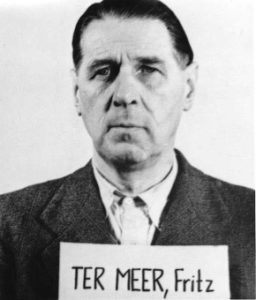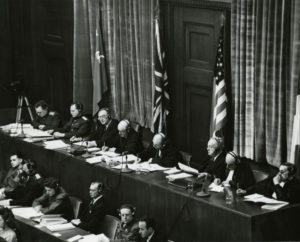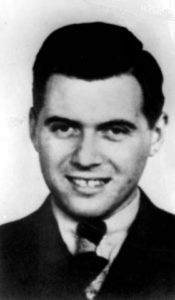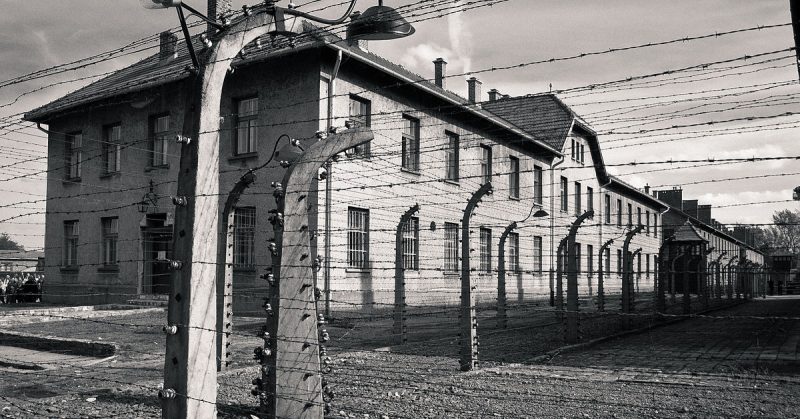Everyone has heard of Bayer, the pharmaceutical company that runs aspirin commercials on television. Not everyone knows, however, of Bayer’s dark past.
The successor of pharmaceutical conglomerate IG Farben, the company was a huge donor to Hitler’s electoral campaign and supporter of the Nazis.
IG Farben worked closely with the Nazi party to take over manufacturing plants when the Germans invaded other European countries. IG Farben also held stock in and was represented on the board of the company which produced the gas used in the Holocaust gas chambers.
Some historians have suggested that without IG Farben, Hitler could not have risen to power and there would not have been a second world war.

The Beginning
After the end of World War I, chemical companies in Germany merged to form IG Farben. They produced everything from pharmaceuticals to manufacturing chemicals to explosives.
In 1932, representatives met with Hitler to ascertain if he would support their endeavors. They wanted to expand their plants and work on a synthetic gasoline program. Once Hitler officially came to power, they agreed on a formal Reich contract to enlarge their plant and produce gas, through a partnership with both the army and air force.
Concentration Camp Involvement
Auschwitz was much more than a concentration camp. It was also the setting for IG Auschwitz, a 100 percent subsidiary of IG Farben. It was the largest complex in the world manufacturing gasoline and rubber.
It was also where IG Farben tested its products. Prisoners who were considered appropriate candidates were sent to the IG Auschwitz factory. There they were used for human experiments of new vaccines being developed. The unlucky individuals sent to the gas chambers were privy to another kind of IG Farben invention – the synthetic gas Zyklon-B.
The IG Auschwitz factory was not the only place where human testing was being conducted on victims. IG Farben had its own concentration camp. There, tested vaccines and chemicals were applied to both sick and healthy individuals, in the form of injections, pills, enemas and powders. Many fell seriously ill or died as a result of these tests.

Bayer bought many of these prisoners from the Auschwitz camp. Letters have been found written between the two organizations regarding the buying of 150 inmates, who were to be used for the testing of a new sleeping pill. The women were bought at 170 RM (Reichsmark) each, and records show they were in a satisfactory condition, despite being emaciated.
Later, follow-up messages indicate all prisoners died, and they required to buy a further shipment.
An Auschwitz resident testimonial states there was a large ward where all tuberculous patients were kept. Bayer sent unmarked medicines to this ward. These were injected into the test subjects, causing them all to die.
IG Farben’s other branches dealing with pharmaceuticals conducted experiments too, including typhus fever. They were not successful. It was decided the tests were invalid, as the subjects tested were in poor condition, and the laboratories provided were not ideal.
The Nuremberg War Trials
After the war was over, the Nuremberg War trials sentenced 24 IG Farben board members and executives with mass murder and slavery, among other crimes.
However, none of these people received long prison terms, and all were released to continue their work in the German pharmaceutical industry.

Modern Day
Today, IG Farben is recognized by its modern names, Bayer, BASF and Hoechst/Aventis.
One Auschwitz Survivor tried to win compensation from Bayer due to the medical experiments she underwent while there. Zoe Polanska Palmer, now in her 80s, was featured in a BBC TV documentary in the early 2000s.
Palmer was a prisoner at the camp at age 13 and would have been gassed once she was no longer useful as an experimental subject. She was given many tablets and pills which are believed to have been for birth control being tested at the time.
She was saved during the Russian liberation of the camp and then settled in Scotland. She says the person doing tests on her at the time was Dr. Victor Capesius, who worked for Bayer and assisted Josef Mengele with genetic experiments on children.
She has suffered through multiple operations to try to reverse the damage done by the testing, but she has remained infertile and now has cancer.

While the BBC was making the documentary on Palmer, they contacted Bayer for a statement. Bayer said, “Between 1925 and 1952, no company named Bayer existed, neither as a subsidiary of IG Farben nor as any other legal entity. Bayer has worked in good faith with the German government to establish a fund to help those who have suffered. The company’s contribution to this fund amounted to more than 40 million pounds.”
Although Bayer went as a different name at the time, that does not excuse them for their actions.
IG Farben, when creating Bayer, gave them property once belonging to a Jewish cemetery. The Bayer factory stands on that land. The Coalition Against Bayer-Dangers demanded the company apologize for defiling the cemetery and affix a plaque commemorating the spot.
In 1995, Bayer issued a public apology for the company’s involvement in the Holocaust.
